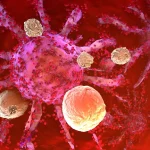Mouth and throat
The mucous membranes in the mouth and throat are very sensitive tissue and are therefore more affected by certain treatments.
Useful tips
- Eat as usual, but change the texture of food so as not to irritate your mouth and throat.
- Cook food longer than usual.
- Add broth, vegetable cooking water, milk soup or clear soup to cooked food.
- Use baby food as a replacement for home-made puree if you are unable to cook.
- Place these foods in the freezer for about five minutes before eating; their taste will be more enjoyable.
- Mix pureed meat into soups, clear soups, creams and vegetable purees.
- Grind nuts and grains into a fine powder and mix with yogurt, ice cream and fruit compote.
- Avoid:
- Strong and pungent spices, such as curry, chili, pepper, etc. Go for milder seasonings, such as herbs and onion powder;
- Pickled or acidic foods (lemons, oranges, etc.);
- Very salty or hard foods (vegetables, toast, nuts, etc.);
- Vey hot food (let it cool down);
- Tobacco and alcoholic beverages.
- Put the meal through a blender: when pain in the mouth or throat makes it difficult or impossible to handle solid food, putting the food through the blender is the ideal solution. By altering the texture of food, you can eat what the rest of the family is eating at any time, and even try out new recipes. Here are some tips for better mixing:
- Make sure meat is cooked before putting it into the blender;
- Cut cooked food and bread into cubes;
- Melt butter and margarine before adding, so that they blend better with other foods;
- Add enough liquid to achieve the desired consistency. One portion of liquid to one solid portion usually produces the right consistency;
- Season less liberally, because the taste is more pronounced in a liquid meal than in a solid meal.
Stomatitis: definition
An inflammation of the mouth and a potentially ulcerous, uncomfortable and painful condition that primarily affects the oral mucous membrane, the soft palate, the anterior part of the tongue and the floor of the mouth, and may be accompanied by infection. Associated symptoms may make chewing, swallowing and speech difficult. Radiation therapy to the region of the head and throat (ENT sphere cancers) and certain chemotherapies are the most common causes of stomatitis.
Signs and symptoms
- Redness and swelling at the corners (junction) of mucosal tissue and on the lips.
- Sensation of dryness and burning in the mouth.
- White spots on the tongue and mucous membrane, accompanied by a metallic taste in the mouth; these spots detach easily to reveal a red, ulcerated surface;
- Appearance, especially on the lips, painful and irritating vesicles (blisters), that itch and are filled with pus (herpes simplex);
Helpful hints
- Have a high protein snack following the treatment session.
- Favor a soft, nutritious diet.
- Start the meal by lubricating your mouth with a tablespoon of cream or oil.
- Take small sips of water between bites to moisten your mouth.
- Avoid liquids coming into contact with an irritated mouth by using a straw.
- Consume iced foods or liquids to help relieve the symptoms of irritation.
- Rest in a sitting position in a quiet room (avoid lying down for at least two hours after eating).
- Examine your mouth every day, morning and night, and note any changes in the appearance and texture of your mouth, lips, gums, teeth, saliva and tongue.
- Monitor any change of taste in your mouth and in your taste perception.
- Drink ice water or suck ice cubes for 30 minutes during chemotherapy.
- Maintain oral hygiene:
- Clean your mouth within 30 minutes after eating and repeat every 4 hours;
- Avoid commercially-available toothpastes and mouthwashes as well as antiseptics based on glycerine and lemon because they contain chemicals that irritate and dry out the oral mucosa;
- Replace your usual toothpaste and mouthwash with a solution of water, salt and baking soda:
- Recipe: mix one teaspoon of salt and one spoonful of baking soda with one liter of boiled water. This solution must be prepared daily and kept at room temperature;
- Gargle for at least 30 seconds with 15 ml of this solution, spit and repeat 4 times a day, more often if necessary;
- Brush your teeth with a soft brush or a foam mini-brush at least twice a day and floss once a day if tolerated (do not floss or use toothpicks if gums are bleeding);
- Clean dentures just as often; if your mouth is very painful, only wear them to eat;
- Keep lips moist with cream or ointment for the lips;
- Drink two to three liters of fluid per day, unless otherwise directed by the medical team.
- Avoid alcohol, tobacco and foods that can irritate the oral mucosa due to their acidity, seasoning or texture.
Stomatitis can be very painful and uncomfortable. We advise you to contact the oncology team in the following situations:
- Presence of painful or bleeding ulcers (four or more);
- Unrelieved pain;
- Significant weight loss for one or two weeks;
- Inability to drink or eat;
- Difficulty breathing.
Dry Mouth (xerostomia)
Some treatments that affect the salivary glands can reduce saliva production. They can also make your saliva thick and sticky. This results in discomfort, influences food intake and increases the risk of cavities. It is common in people receiving radiation therapy to the head and throat (ENT). Rigorous oral and dental hygiene is required to counter or mitigate these effects.
Helpful hints
- Drink two to three liters of fluid per day, unless otherwise directed by the medical team.
- Eat popsicles or drink iced water or unsweetened fruit juice.
- Eat sweets or sugarless gum designed to promote salivation; you can find these in pharmacies.
- Eat meat together with sauce and broth to help you swallow it more easily.
- Avoid drinks and foods that make you thirsty: coffee, dark chocolate, salt, spices, alcohol, sauces and savory dishes.
- Use a spray or gel saliva substitute (sold in pharmacies).
- Prevent ulcers and tooth decay by maintaining good oral and dental hygiene.
- Moisturize your lips with a cream or ointment for the lips.
- Make sure to rinse your mouth in the morning because saliva that has accumulated during the night can cause nausea.
- Use a mild mouthwash consisting of the following solution: one teaspoon of salt and one teaspoon of baking soda mixed with one liter of boiled water. Repeat several times a day, and continue to use it in addition to any mouthwash prescribed by the oncologist.
- Brush your teeth after every meal.
- Drink unsweetened or sugarless lime or lemon beverages or add some lemon juice to a glass of water.































